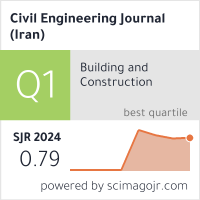Model Development for the Prediction of the Resilient Modulus of Warm Mix Asphalt
Downloads
Increasing material prices coupled with the emission of hazardous gases through the production and construction of Hot Mix Asphalt (HMA) has driven a strong movement toward the adoption of sustainable construction technology. Warm Mix Asphalt (WMA) is considered relatively a new technology, which enables the production and compaction of asphalt concrete mixtures at temperatures 15-40 °C lower than that of traditional hot mix asphalt. The Resilient modulus (Mr) which can be defined as the ratio of axial pulsating stress to the corresponding recoverable strain, is used to evaluate the relative quality of materials as well as to generate input for pavement design or pavement evaluation and analysis. Based on the aforementioned preface, it is possible to conclude that there is a real need to develop a predictive model for the resilient modulus of the pavement layer constructed using WMA. Within the experimental part of this study, 162 cylindrical specimens of WMA were prepared with dimensions of 101.6 mm in diameter and 63.5 mm in thickness. The specimens were subjected to the indirect tension test by pneumatic repeated loading system (PRLS) to characterize the resilient modulus. The test conditions (temperature and load duration) as well as mix parameters (asphalt content, filler content and type, and air voids) are considered as variables during the specimen's preparation. Following experimental part, the statistical part of the study includes a model development to predict the Mr using Minitab vs 17 software. The coefficient of determination (R2) is 0.964 for the predicted model which is referred to a very good relation obtained. The Mr value for the WMA is highly affected by the temperature and moderately by the load duration, whereas the mix parameters have a lower influence on the Mr.
Downloads
[2] Diab, Aboelkasim, Cesare Sangiorgi, Rouzbeh Ghabchi, Musharraf Zaman, and Amr M. Wahaballa. "Warm Mix Asphalt (WMA) Technologies: Benefits and Drawbacks”a Literature Review.” Functional Pavement Design (October 14, 2016): 1145–1154. doi:10.1201/9781315643274-121.
[3] Gandu Srikanth, Rajiv Kumar, Rohit Vasudeva "A review of warm mix." Proceedings of National Conference: Advanced Structures, Materials and Methodology in Civil Engineering (ASMMCE 2018), National Institute of Technology, Jalandhar, Punjab.
[4] Rubio, M. Carmen, Germán Martínez, Luis Baena, and Fernando Moreno. "Warm Mix Asphalt: An Overview.” Journal of Cleaner Production 24 (March 2012): 76–84. doi:10.1016/j.jclepro.2011.11.053.
[5] Goh, Shu Wei, Zhanping You, and Thomas J. Van Dam. "Laboratory evaluation and pavement design for warm mix asphalt." In Proceedings of the 2007 Mid-Continent transportation research symposium, pp. 1-11. 2007.
[6] Goh, Shu Wei. "Development and improvement of warm-mix asphalt technology." (2012). Available online: https://digitalcommons.mtu.edu/cgi/viewcontent.cgi?article=1238&context=etds (accessed on 1 January 2020).
[7] Wahjuningsih, N, S P Hadiwardoyo, R J Sumabrata, and M Anis. "Performance of Warm Mix Asphalt with Buton Natural Asphalt-Rubber and Zeolite as an Additives.” IOP Conference Series: Earth and Environmental Science 106 (January 2018): 012047. doi:10.1088/1755-1315/106/1/012047.
[8] Sağlik, Ahmet, and A. Gurkan Gungor. "Resilient Modulus of Unbound and Bituminous Bound Road Materials." In 5th Eurasphalt & Eurobitume Congress, pp. 455-463. 2012.
[9] Huang, Y., H. "Pavement-Analysis and-Design”, 2nd-Edition, Pearson-Prentice Hall, Upper-Saddle River, NJ 07458, New-Jersey, USA 2004.
[10] Ahmed, Kashif, Muhammad Irfan, Sarfraz Ahmed, Arsalan Ahmed, and Afaq Khattak. "Experimental Investigation of Strength and Stiffness Characteristics of Hot Mix Asphalt (HMA).” Procedia Engineering 77 (2014): 155–160. doi:10.1016/j.proeng.2014.07.026.
[11] Fakhri, Mansour, and Ali Reza Ghanizadeh. "An Experimental Study on the Effect of Loading History Parameters on the Resilient Modulus of Conventional and SBS-Modified Asphalt Mixes.” Construction and Building Materials 53 (February 2014): 284–293. doi:10.1016/j.conbuildmat.2013.11.091.
[12] Wibisono, G, and H R Nikraz. "Resilient Modulus Values of Western Australia Asphalt Pavement.” IOP Conference Series: Materials Science and Engineering 615 (October 15, 2019): 012129. doi:10.1088/1757-899x/615/1/012129.
[13] You, Zhanping, Shu Wei Goh, and Qingli Dai. Laboratory evaluation of warm mix asphalt. No. RC-1556. Michigan. Dept. of Transportation, 2011. Available online: https://rosap.ntl.bts.gov/view/dot/23692/dot_23692_DS1.pdf?download-document-submit=Download (accessed on 10 January 2020).
[14] Hurley, Graham C., and Brian D. Prowell. "Evaluation of Aspha-Min zeolite for use in warm mix asphalt." NCAT report 05-04 (2005).
[15] Hamzah, Meor O., and T. C. Yi. "Effects of temperature on resilient modulus of dense asphalt mixtures incorporating steel slag subjected to short term oven ageing." World Academy of Science, Engineering and Technology 46 (2008): 221-225.
[16] Goh, Shu Wei, and Zhanping You. Mechanical Properties of Warm Mix Asphalt Using Aspha-min®. No. 08-1627. 2008.
[17] Hilal, Miami. "Prediction of Resilient Modulus Model for Wearing Asphalt Pavement Layer.” Kufa Journal of Engineering 09, no. 4 (November 25, 2018): 65–87. doi:10.30572/2018/kje/090405.
[18] Albayati, Amjad H. "Performance Evaluation of Plant Produced Warm Mix Asphalt.” Journal of Engineering 24, no. 5 (May 1, 2018): 145. doi:10.31026/j.eng.2018.05.10.
[19] Abdulmajeed, Sohaib Ghasan, and Ratnasamy Muniandy. "The Effect of Binder Type and Temperature Differential on the Rutting Performance of Hot Mix Asphalt." International Journal of Applied Engineering Research 12, no. 17 (2017): 6841-6852.
[20] Little, D. N., W. W. Crockford, and V. K. R. Gaddam. Resilient Modulus of Asphalt Concrete. Final Report. No. FHWA/T93-1177-1F. (1992).
[21] Khan, M. Imran, H. A. N. I. F. Ullah, Kamran M. Khan, K. U. Khan, and M. Arifuzzaman. "Evaluation of speed effect of vehicles on asphalt pavement." Implementing Innovative Ideas in Structural Engineering and Project Management (2015).
[22] Shafabakhsh, Gholamali, and Amin Tanakizadeh. "Evaluation of Resilient Behavior of Flexible Pavement Asphalt Layers.” Materials and Structures 49, no. 7 (August 14, 2015): 2829–2840. doi:10.1617/s11527-015-0689-0.
[23] Sarsam, Saad Issa, and Zainalabiden Nihad. "Comparative Assessment of Resilient Characteristics of Warm and Hot Mix Asphalt Concrete." International Journal of Advanced Materials Research, American institute of science, PSF 5, no. 1 (2019): 1-11.
[24] Neham, S. S Development of predictive models for the resilient modulus of asphalt concrete mixtures PhD thesis submitted to department of civil engineering the University of Baghdad (2015).
[25] Puzi, Ahmad, Marliana Azura, Tuan Hassan, and Tuan Noor Rafidah. "The effect of state factors on resilient modulus of bituminous mixture." (2010). Available online: http://eprints.uthm.edu.my/id/eprint/2731 (accessed on 23 January 2020).
[26] Huan, Yue, Peerapong Jitsangiam, and Hamid Nikraz. "Effects of Active Filler Selection on Foamed Bitumen Mixture in Western Australia.” Applied Mechanics and Materials 90–93 (September 2011): 457–465. doi:10.4028/www.scientific.net/amm.90-93.457.
[27] SCRB. "General Specification for Roads and Bridges.” Section R/9, Hot-Mix Asphalt Concrete Pavement, Revised Edition. State Corporation of Roads and Bridges (2003), Ministry of Housing and Construction, Republic of Iraq.
[28] ASTM, D. "Standard test method for indirect tension test for resilient modulus of bituminous mixtures." In American Society for Testing and Materials. 1982.
- Authors retain all copyrights. It is noticeable that authors will not be forced to sign any copyright transfer agreements.
- This work (including HTML and PDF Files) is licensed under a Creative Commons Attribution 4.0 International License.![]()















